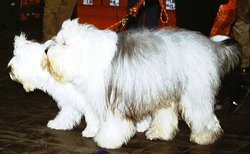
|
From Wikipedia the free encyclopedia, by MultiMedia |
| Old English Sheepdog | ||
|---|---|---|

Pair of Old English Sheepdogs
|
||
| Alternative names | ||
| Bobtail | ||
| Country of origin | ||
| United Kingdom | ||
| Common nicknames | ||
| Classification and breed standards | ||
| FCI: | Group 1 Section 1 #16 | |
| AKC: | Herding | |
| ANKC: | Group 5 (Working Dogs) | |
| CKC: | Group 7 - Herding Dogs | |
| KC (UK): | Pastoral | |
| NZKC: | Working | |
| UKC: | Herding Dog Breeds | |
| Not recognized by any major kennel club | ||
| This breed of dog is extinct | ||
| Notes | ||
An Old English Sheepdog is a breed of dog formerly used for herding livestock, and now primarily kept as a pet. They are best known for their shaggy grey and white fur which also covers their face, including their eyes, which leads some casual observers to wonder how they can see.
Males generally weigh 70 to 100 pounds although some can get up to 100 pounds (45 kg); females, 60 to 80 pounds. They stand around 22 inches at the withers. Their long coats can be any shade of gray, grizzle, blue, or blue merle, with optional white markings. The undercoat is water resistant. The Old English Sheepdog's abundant coat is an effective insulator in both hot and cold weather.
This breed is intelligent, funny, social, and adaptable. It generally gets along well with children, other dogs, other pets, and visitors. Like all herding breeds, it requires plenty of exercise, both mental and physical.
The long coat requires thorough brushing at least weekly, and the long hair around the pads of the feet can form mats if it isn't kept trimmed.
Some people save their Old English Sheepdog's shed hairs at moulting and have spun it into yarn.
Dogs, made by MultiMedia | Free content and software
This guide is licensed under the GNU Free Documentation License. It uses material from the Wikipedia.